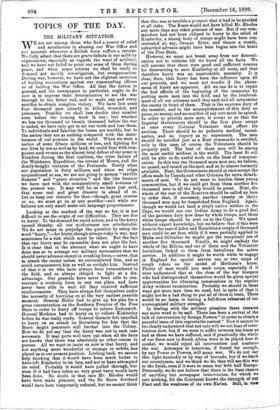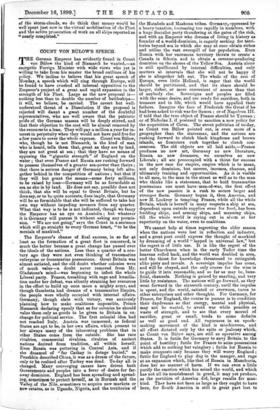TOPICS OF THE DAY.
THE MILITARY SITUATION.
\ATE are not among those who find a source of relief and satisfaction in abusing our War Office and our generals whenever a British force suffers a reverse. We fully admit that there are grave defects in our milit Lry organisation, especially as regards the want of artillery, and we have not failed to point out some of them during peace, and when peace returns we shall be ready to demand not merely investigation, but reorganisation. During war, however, we have not the slightest intention of hurling accusations against our commanding officers or of baiting the War Office. All that the nation in general, and the newspapers in particular, ought to do now is to express their determination to see the war through to the bitter end, and to make any and every sacrifice to obtain complete victory. We have lost some four thousand men already in killed, wounded, and prisoners. Possibly we shall lose double that number even before the coming week is out ; but whether we lose ten thousand or twenty thousand before the war is ended, we have only got to set our teeth and lose them. To individuals and families the losses are terrible, but to the nation they are as nothing compared with the main- tenance of our position in the world. When we were a nation of some fifteen millions or less, and fighting for our lives by sea as well as by land, we could bear with com- posure such events as the almost total defeat of our army in Flanders during the first coalition, the utter failure of the Walcheren Expedition, the retreat of Moore, and the dearly-bought victories of the Peninsula. Surely when our population is forty millions, and when we reign unquestioned at sea, we are not going to scream "terrible disaster " and " grave situation " and the like because we have met with the comparatively small reverses of the present war. It may well be, as we have just said, that some real and great disaster is ahead of us. Let us keep our rhetoric for that—though, great reverse or no, we must go on at any sacrifice—and while our failures are only small make our language proportionate.
Looking at the conduct of the war so far, it is not difficult to see the origin of our difficulties. They are due to hurry. To the demand for rapid action, and to the hurry caused thereby, all our misfortunes are attributable. We do not mean to prejudge the question by using the word "hurry,"—for hurry,though always risky in war, may sometimes be a risk which must be taken. But the fact that our hurry may be excusable does not alter the fact. It is clear that in the abstract what we ought to have done was so to arrange our military movements that we should never advance except in crushing force,—never, that is, attack the enemy unless we outnumbered him, and so could outmanoeuvre him as well as outfight him. Instead of that it is we who have always been outnumbered in the field, and so always obliged to fight at a dis- advantage. Our generals have never been able to con. centrate a crushing force in any one place, and have never been able to wait till they received sufficient reinforcements. They have always felt themselves under the necessity of hurrying on at the very earliest possible moment. General Buller bad to give up his plan for a great concentration on the Southern Frontier of the Free State in order to hurry off troops to relieve Ladysmith. General Methuen had to hurry on to relieve Kimberley before he was really ready. General Gatacre felt impelled to hurry on an attack on Stormberg for fear that the Boers might penetrate still further into the Colony. Now we do not say that the hurry was not in each case necessary. It may quite well turn out when all the facts are known that there was absolutely no other course to pursue. All we want to insist on now is that hurry, and not anything more wonderful or strange or subtle, has placed us in our present position. Looking back, we cannot help thinking that it would- have been much better to have left Kimberley to its fate, and not to have attempted its relief. Probably it would have pulled through, but even if it had been taken no very great harm would have been done. No doubt in that case Mr. Rhodes would have been made prisoner, and the De Beers dividend would have been temporarily reduced, but we cannot think that this was so terrible a prospect that it had to be avoided at all risks. The Boers would not have killed Mr. Rhodes any more than any other prisoner of war. But if our com- manders had not been obliged to hurry to the relief of Kimberley, a strong body of troops might have been con- centrated at, say, Orange River, and thence a steady, unhurried advance might have been begun into the heart of the Free State. .
However, we must not break away from our determi- nation not to criticise till we know all the facts. We will assume that there were good and sufficient reasons for determining to save Kimberley at all costs, and that therefore hurry was an unavoidable necessity. It is clear, then, that hurry has been the influence upon all our generals, and we must not wonder if the pheno- mena of hurry are apparent. All we can do is to repair the bad effects of the beginning of the campaign by putting more men into the field, and by the reinforce- ment of all our columns until they each and all outnumber the enemy in front of them. That is the supreme duty of the moment, and in the accomplishment of this duty no pains, no money, and no sacrifice of any sort must be spared. In order to provide more men, it seems to us that the Imperial Government should in the first place accept at once every Colonial Volunteer that offers his services. • There should be no pedantic medical exami- nation, and no inquiry as to experience. The men should be enrolled just as a Boer commando is enrolled, only in this case, of course, the Volunteers should be properly paid. The best of these men will be among the most useful soldiers in the world. The least fit will still be able to do useful work on the lines of communi- cation. In this way ten thousand more men can, we believe, be raised, and raised on the spot, and so be almost instantly available. Next, the Government should at once accept the offers made by Canada and other Colonies for extra detach- ments of men. We do not want to burden these young communities, but if we could get from them another five thousand men in all the help would be great. Next, the whole of the rest of the Reserves should be called up here in order that, if necessary, another twenty or thirty thousand men may be despatched from England. Again, though we would not land a single native soldier in the Cape, we would use our Indian Army to do a good deal of the garrison duty now done by white troops, and those white troops should be sent on to the Cape. We speak without expert knowledge, but we believe that if this were done in the case of Aden and Mauritius a couple of thousand men could be set free, while if it were partially applied to Malta and Gibraltar we might get the temporary use of another five thousand. Finally, we might embody the whole of the Militia, and out of them and the Volunteer battalions linked to them form battalions for active service. In addition it might be worth while to engage in England for special service one or two corps of rough riders on the model of Methuen's horse. Plenty of men would join such corps, especially if it were understood that at the close of the war troopers who had distinguished themselves would be given special opportunities for obtaining commissions in the regular Army without examination. Probably we should in these ways get more men than we need, but in spite of that it might not be a bad thing to put all of them in train. There would be no harm in having a full-dress rehearsal of our unrecognised military strength.
In dealing with the military situation there remains one more word to be said. There has been a revival of the talk of intervention by foreign Powers " in order to obtain.a peaceful issue of this regrettable contest." Now it cannot be too clearly understood that not only will we not hear of inter- vention now, but if we were to suffer reverses ten times as bad as those we have suffered, and if practically the whole of our force now in South Africa were to be placed hors de combat, we would reject all intervention and continue the war. Attempts to intervene, if forced far enough, by any Power or Powers, will mean war. We do not say this light-heartedly or by way of bravado, but if we know our countrymen, and we think we do, they will see this war to the finish, even if it were to mean war with half Europe. Personally, we do not believe that there is the least-chance of anything but newspaper intervention, for which we care nothing, for the Continent knows the strength of our Fleet and the weakness of its own Navies. Still, in., view of the storm-clouds, we do think that money would be well spent just now in the virtual mobilisation of she Fleet and the active prosecution of work on all chips reported as 14 nearly completed."











































 Previous page
Previous page